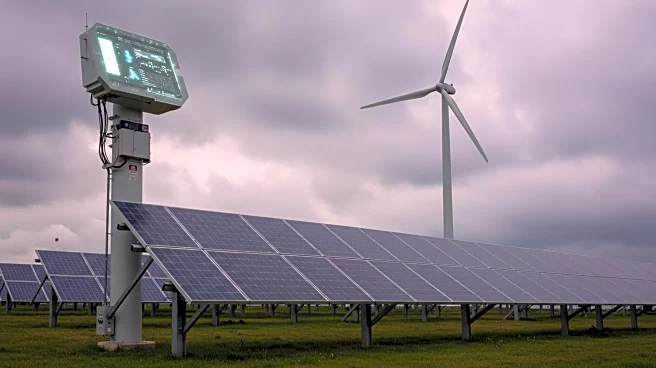What's Happening?
NV Energy has requested a waiver from federal regulators to allow renewable energy clients to exit their transmission agreements without penalty. This move comes in response to President Trump's policies, including the One Big Beautiful Bill Act, which have reduced clean energy tax credits for projects on federal land. NV Energy argues that these policies have created significant challenges for solar and wind developers, particularly those with projects on land managed by the Bureau of Land Management. The utility's request aims to provide a 60-day window for interconnection customers to withdraw without penalty, potentially clearing the queue of unfeasible projects. The Solar Energy Industries Association and the Interwest Energy Alliance support this waiver, suggesting it would allow uncertain projects to terminate quickly and recover commercial deposits.
Why It's Important?
The waiver request by NV Energy highlights the broader impact of President Trump's policies on the renewable energy sector. By phasing out clean energy tax credits, these policies are expected to increase energy prices and reduce investment in renewables, potentially shrinking Nevada's GDP by billions over the next decade. This situation underscores the tension between federal policy and state-level renewable energy goals, affecting industries reliant on clean energy, such as mining and data centers. The waiver could help developers refocus on viable projects, but it also signals potential setbacks in achieving renewable energy targets and economic growth in Nevada.
What's Next?
If approved, NV Energy's waiver could lead to a reorganization of renewable energy projects in Nevada, allowing developers to concentrate on projects that remain economically viable. The utility's efforts to clear the queue may pave the way for more feasible projects, aligning with state renewable standards despite federal policy changes. The outcome of this waiver request could influence future interactions between state and federal energy policies, particularly in how they affect the development of solar and wind energy on federal lands.
Beyond the Headlines
The waiver request raises questions about the long-term implications of federal energy policies on state economies and the renewable energy sector. It highlights the ethical and economic challenges of balancing cost-cutting measures with environmental sustainability. The situation may prompt discussions on the role of federal oversight in renewable energy development and the need for policies that support both economic growth and environmental goals.









